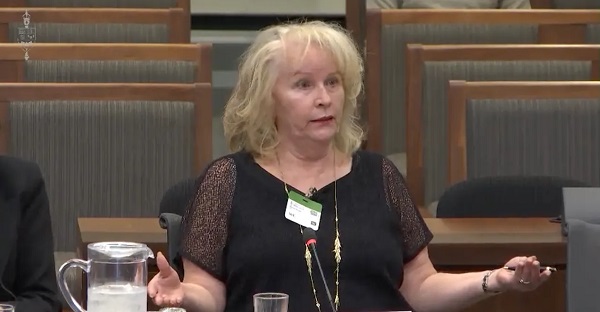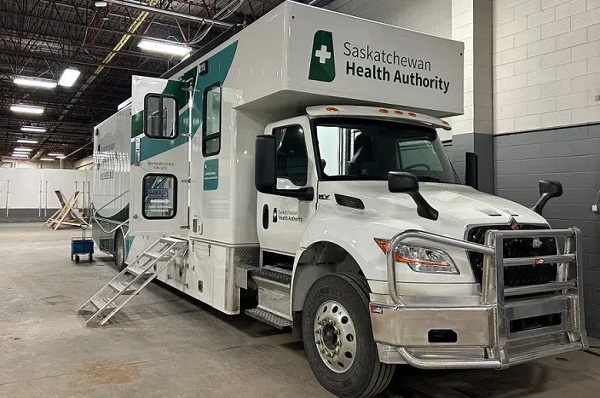Addictions
Ottawa “safer supply” clinic criticized by distraught mother

An Ottawa mother, who lost her daughter to addiction, is frustrated by Recovery Care’s failure to help her opioid-addicted son
Masha Krupp has already lost one child to an overdose and fears she could lose another.
In 2020, her 47-year-old daughter Larisa died from methadone toxicity just 12 days into an opioid addiction treatment program. The program is run by Recovery Care, an Ottawa-based harm reduction clinic with five locations across the city, which aims to stabilize drug users and eventually wean them off more potent drugs.
Krupp says she is skeptical about the effectiveness of the support and counseling services that Recovery Care claims to provide and believes the clinic was negligent in her daughter’s case.
On Oct. 22, the Ottawa mother testified before the House of Commons Standing Committee on Health, which is studying Canada’s opioid epidemic.
In her testimony, Krupp said her daughter was prescribed 30mg of methadone — 50 per cent more than the recommended induction dose — and was not given an opiate tolerance test before starting the program. Larisa received treatment at the Bells Corners Recovery Care location.
Krupp’s 30-year-old son, whom Canadian Affairs agreed not to name, has been a patient at Recovery Care’s ByWard Market location since 2021, where he receives a combination of methadone and hydromorphone, another prescription drug administered through the treatment program.
“Three years later, my son is still using fentanyl, crack cocaine and methadone, despite being with Dr. [Charles] Breau and with Recovery Care for over three years,” Krupp testified.
“About four weeks ago, I had to call 9-1-1 because he was overdosing,” Krupp told Canadian Affairs in an interview. “This is on the safer supply program … three years in, I should not be calling 9-1-1.”
Open diversion
Founded in 2018, Recovery Care is a partner in the Safer Supply Ottawa initiative. The initiative, which is led by Ottawa Public Health and managed by the nonprofit Pathways to Recovery, provides prescription pharmaceutical opioids to individuals who are at high risk of overdose.
Pathways to Recovery works with a network of service providers throughout the city — including Recovery Care — to administer safer supply.
Krupp says she supports the concept of safer supply, but believes it needs to be administered differently.
“You can’t give addicts 28 pills and say ‘Oh here you go,’” she said in her testimony. “They sell for three dollars a pop on the street,” she said, referring to the practice of some individuals selling their prescribed medications to fund purchases of more intense street drugs like heroin and fentanyl.
Krupp says she sees her son — and other patients of the program — openly divert their prescribed medications outside of the Recovery Care clinic in ByWard Market, where she parks to wait for him.
“[B]ecause there’s no treatment attached to [my son’s safer supply], it’s just the doctor gives him all these pills, he diverts them, gets the drugs he needs, and he’s still an addict,” Krupp said in her testimony.
Donna Sarrazin, chief executive of Recovery Care, told Canadian Affairs that Recovery Care has measures to address diversion, including security cameras and onsite security staff.
“Patients are educated at intake and ongoing that diversion is not permitted and that they could be removed from the program,” she said in an emailed statement.
“Recovery Care works to understand diversion and has continued to progress programs and actions to address the issues. Concerns expressed by the community and our teams are taken seriously,” she said.
Krupp says she has communicated her concerns about her son reselling his prescribed medications to his doctor, Dr. Charles Breau, both in-person and through faxed letters. “I never hear back from the doctor. Never,” she said.
Krupp also said in her testimony that police have spoken to her son about his diversion.
Breau did not respond to inquiries made to his clinical teams at Recovery Care or Montfort Hospital, a teaching hospital affiliated with the University of Ottawa.
Sarrazin said Breau is not able to comment on patient or family care.
In Krupp’s view, the safer supply program would be more successful if drug users were required to take prescribed medications under supervision.
“If he was receiving his hydromorphone under witnessed dosage and there was a treatment plan attached to it, I believe it would be successful,” she said.
Dr. Eileen de Villa, the City of Toronto’s medical officer of health, reinforced this point at the Oct. 22 Health Committee meeting. She said Toronto Public Health’s injectable opioid agonist therapy program — which combines observed administration with a treatment plan — has seen “incredible results.”
De Villa shared a case of a pregnant client who entered the program. “She went on to have a successful pregnancy, a healthy baby, has actually successfully completed the treatment, and is now housed and has even gained custody of her other children,” she said.
Subscribe for free to get BTN’s latest news and analysis, or donate to our journalism fund.
‘An affront to me’
Krupp also says Recovery Care fails to deliver on its promise of supporting patients’ mental health needs. Recovery Care’s website says its clinics offer “mental health programs which are essential to every treatment plan.”
Krupp and her son’s father have both requested a clear treatment plan and consistent counselling for their son. But he was started on safer supply after participating in only one virtual counselling session, she says.
She says Recovery Care has only one mental health counselor who services four of Recovery Care’s clinics. “If you’re getting $2-million-plus a year in funding, you should be able to staff each clinic with one on-site counselor five days a week,” she said.
Instead of personalized assistance, her son received “a sheaf of photocopies” offering generic services like Narcotics Anonymous and crisis helplines. “It’s almost an affront to me, as a taxpayer and a mother of an addict,” Krupp said.
Krupp says that, following her testimony to the parliamentary committee, Breau reached out to offer her son a mental health counseling session for the first time.
Sarrazin told Canadian Affairs that patients are encouraged to request counseling at any time. “Currently there is no wait list and appointments can be booked within 1 week,” she said in her emailed statement.
Class actions
Today, Krupp is considering launching a class-action lawsuit against Health Canada and the Government of Canada, challenging both the enactment of safer supply and the loosening of methadone dispensing requirements in 2017. She believes these changes contributed to her daughter’s death in 2020.
She is also considering joining an existing class-action lawsuit in B.C., which alleges Health Canada failed to monitor the distribution of drugs provided through safer supply programs.
The Pathways to Recovery initiative received $9.69-million in funding from Health Canada from July 2020 to March 2025. In June 2023, Health Canada allocated an additional $1.9 million to expand Ottawa’s safer supply program across five sites and improve access to practitioners, mental health support, housing and other services.
“I want to see that money being put to a recovery based treatment, not simply people going in and out and getting their medications and just creating this new sub-layer of addicts,” Krupp said.
This article was produced through the Breaking Needles Fellowship Program, which provided a grant to Canadian Affairs, a digital media outlet, to fund journalism exploring addiction and crime in Canada. Articles produced through the Fellowship are co-published by Break The Needle and Canadian Affairs.
Subscribe for free to get BTN’s latest news and analysis, or donate to our journalism fund.
Addictions
New RCMP program steering opioid addicted towards treatment and recovery

News release from Alberta RCMP
Virtual Opioid Dependency Program serves vulnerable population in Red Deer
Since April 2024, your Alberta RCMP’s Community Safety and Well-being Branch (CSWB) has been piloting the Virtual Opioid Dependency Program (VODP) program in Red Deer to assist those facing opioid dependency with initial-stage intervention services. VODP is a collaboration with the Government of Alberta, Recovery Alberta, and the Alberta RCMP, and was created to help address opioid addiction across the province.
Red Deer’s VODP consists of two teams, each consisting of a police officer and a paramedic. These teams cover the communities of Red Deer, Innisfail, Blackfalds and Sylvan Lake. The goal of the program is to have frontline points of contact that can assist opioid users by getting them access to treatment, counselling, and life-saving medication.
The Alberta RCMP’s role in VODP:
- Conducting outreach in the community, on foot, by vehicle, and even UTV, and interacting with vulnerable persons and talking with them about treatment options and making VODP referrals.
- Attending calls for service in which opioid use may be a factor, such as drug poisonings, open drug use in public, social diversion calls, etc.
- Administering medication such as Suboxone and Sublocade to opioid users who are arrested and lodged in RCMP cells and voluntarily wish to participate in VODP; these medications help with withdrawal symptoms and are the primary method for treating opioid addiction. Individuals may be provided ongoing treatment while in police custody or incarceration.
- Collaborating with agencies in the treatment and addiction space to work together on client care. Red Deer’s VODP chairs a quarterly Vulnerable Populations Working Group meeting consisting of a number of local stakeholders who come together to address both client and community needs.
While accountability for criminal actions is necessary, the Alberta RCMP recognizes that opioid addiction is part of larger social and health issues that require long-term supports. Often people facing addictions are among offenders who land in a cycle of criminality. As first responders, our officers are frequently in contact with these individuals. We are ideally placed to help connect those individuals with the VODP. The Alberta RCMP helps those individuals who wish to participate in the VODP by ensuring that they have access to necessary resources and receive the medical care they need, even while they are in police custody.
Since its start, the Red Deer program has made nearly 2,500 referrals and touchpoints with individuals, discussing VODP participation and treatment options. Some successes of the program include:
- In October 2024, Red Deer VODP assessed a 35-year-old male who was arrested and in police custody. The individual was put in contact with medical care and was prescribed and administered Suboxone. The team members did not have any contact with the male again until April 2025 when the individual visited the detachment to thank the team for treating him with care and dignity while in cells, and for getting him access to treatment. The individual stated he had been sober since, saying the treatment saved his life.
- In May 2025, the VODP team worked with a 14-year-old female who was arrested on warrants and lodged in RCMP cells. She had run away from home and was located downtown using opioids. The team spoke to the girl about treatment, was referred to VODP, and was administered Sublocade to treat her addiction. During follow-up, the team received positive feedback from both the family and the attending care providers.
The VODP provides same-day medication starts, opioid treatment transition services, and ongoing opioid dependency care to people anywhere in Alberta who are living with opioid addiction. Visit vodp.ca to learn more.
“This collaboration between Alberta’s Government, Recovery Alberta and the RCMP is a powerful example of how partnerships between health and public safety can change lives. The Virtual Opioid Dependency Program can be the first step in a person’s journey to recovery,” says Alberta’s Minister of Mental Health and Addiction Rick Wilson. “By connecting people to treatment when and where they need it most, we are helping build more paths to recovery and to a healthier Alberta.”
“Part of the Alberta RCMP’s CSWB mandate is the enhancement of public safety through community partnerships,” says Supt. Holly Glassford, Detachment Commander of Red Deer RCMP. “Through VODP, we are committed to building upon community partnerships with social and health agencies, so that we can increase accessibility to supports in our city and reduce crime in Red Deer. Together we are creating a stronger, safer Alberta.”
Addictions
Saskatchewan launches small fleet of wellness buses to expand addictions care

By Alexandra Keeler
Across Canada, mobile health models are increasingly being used to offer care to rural and underserved communities
Saskatchewan has launched a small fleet of mobile wellness buses to improve access to primary health care, mental health and addiction services in the province.
The first bus began operating in Regina on Feb. 12. Another followed in Prince Albert on March 21. Saskatoon’s bus was unveiled publicly on April 9. All three are former coach buses that have been retrofitted to provide health care to communities facing barriers to access.
“Mobile health units are proven to improve outcomes for people facing barriers to healthcare,” Kayla DeMong, the executive director of addiction treatment centre Prairie Harm Reduction, told Canadian Affairs in an email.
“We fully support this innovative approach and are excited to work alongside the health bus teams to ensure the people we support receive the care they need, when and where they need it.”
Wellness buses
Like all provinces, Saskatchewan has been grappling with the opioid crisis.
In 2023, an estimated 457 individuals died from overdoses in the province. In 2024, that number fell to 346. But the province continues to struggle with fatal and non-fatal overdoses.
In late February, Saskatoon firefighters responded to more than 25 overdoses in a single 24-hour period. Just over a week later, they responded to 37 overdoses within another 24-hour window.
Saskatchewan’s wellness buses are part of the province’s plan to address these problems. In April 2025, the province announced $2.4 million to purchase and retrofit three coach buses, plus $1.5 million in annual operating funds.
The buses operate on fixed schedules at designated locations around each city. Each bus is staffed with a nurse practitioner, nurse and assessor coordinator who offer services such as overdose reversal kits, addiction medicine and mental health referrals.
“By bringing services directly to where people are, the health buses foster safer, more welcoming spaces and help build trusting relationships between community members and care providers,” said DeMong, executive director of Prairie Harm Reduction.
Saskatoon-based Prairie Harm Reduction is one of the local organizations that partners with the buses to provide additional support services. Prairie Harm Reduction provides a range of family, youth and community supports, and also houses the province’s only fixed supervised consumption site.
The mobile model
Saskatchewan is not the only province using wellness buses. Across Canada, mobile health models are increasingly being used to expand access to care in rural and underserved communities.
In Kingston, Ont., the Street Health Centre operates a retrofitted RV called PORCH (Portable Outreach Care Hub) that serves individuals struggling with homelessness and addiction.
“Our outreach services are extremely popular with our clients and community partners,” Donna Glasspoole, manager at Street Health Centre, said in an emailed statement.
“PORCH hits the road two to three days/week and offers a variety of services, which are dependent on the health care providers and community partners aboard.”
Street Health Centre also has a shuttle service that picks up clients in shelters and brings them to medical clinics or addiction medicine clinics.
The PORCH vehicles are not supported by provincial funding, but instead rely on support from the United Way and other grants. Glasspoole says the centre’s permanent location — which does receive government funding — is more cost-effective to operate.
“The vehicles are expensive to operate and our RV is not great in winter months and requires indoor parking,” she said.

Politically palatable
Many mobile health models currently do not provide controversial services such as supervised drug consumption.
The Saskatchewan Health Authority told Canadian Affairs the province’s new wellness buses will not offer supervised consumption services or safer supply, where drug users are given prescribed opioids as an alternative to toxic street drugs.
“There are no plans to provide supervised consumption services from the wellness buses,” Saskatchewan Health Authority spokesperson Courtney Markewich told Canadian Affairs in a phone call.
This limited scope may make mobile services more politically palatable in provinces that have resisted harm reduction measures.
In Ontario, some harm reduction programs have shifted to mobile models following Premier Doug Ford’s decision to suspend supervised consumption services located within 200 metres of schools and daycares.
In April, Toronto Public Health ended operations at its Victoria Street fixed consumption site, replacing it with street outreach and mobile vans.
The Ontario government’s decision to close the sites is part of a broader pivot away from harm reduction. The province is investing $378 million to transition suspended sites into 19 new “HART Hubs” that offer primary care, mental health, addictions treatment and other supports.
Glasspoole says that what matters most is not whether services are provided at fixed or mobile locations, but how care is delivered.
Models that “reduce barriers to care, [are] non-judgemental, and [are staffed by] trauma-informed providers” are what lead more people toward treatment and recovery, she said in her email.
In Saskatchewan, DeMong hopes the province’s new wellness buses help address persistent service gaps and build trust with underserved communities.
“This initiative is a vital step toward filling long-standing gaps in the continuum of care by providing low-barrier, community-based access to health-care services,” she said.
This article was produced through the Breaking Needles Fellowship Program, which provided a grant to Canadian Affairs, a digital media outlet, to fund journalism exploring addiction and crime in Canada. Articles produced through the Fellowship are co-published by Break The Needle and Canadian Affairs.









